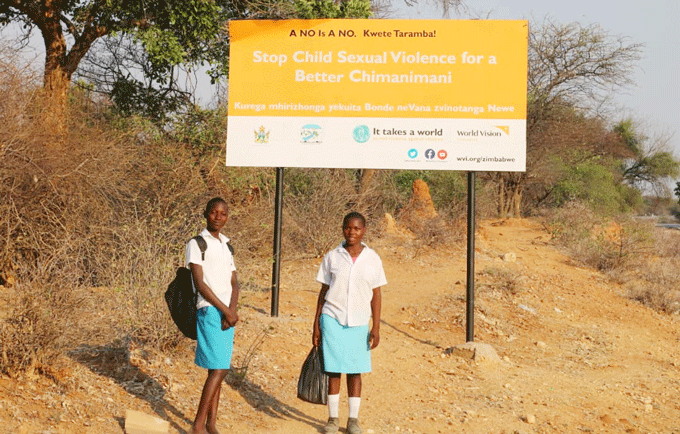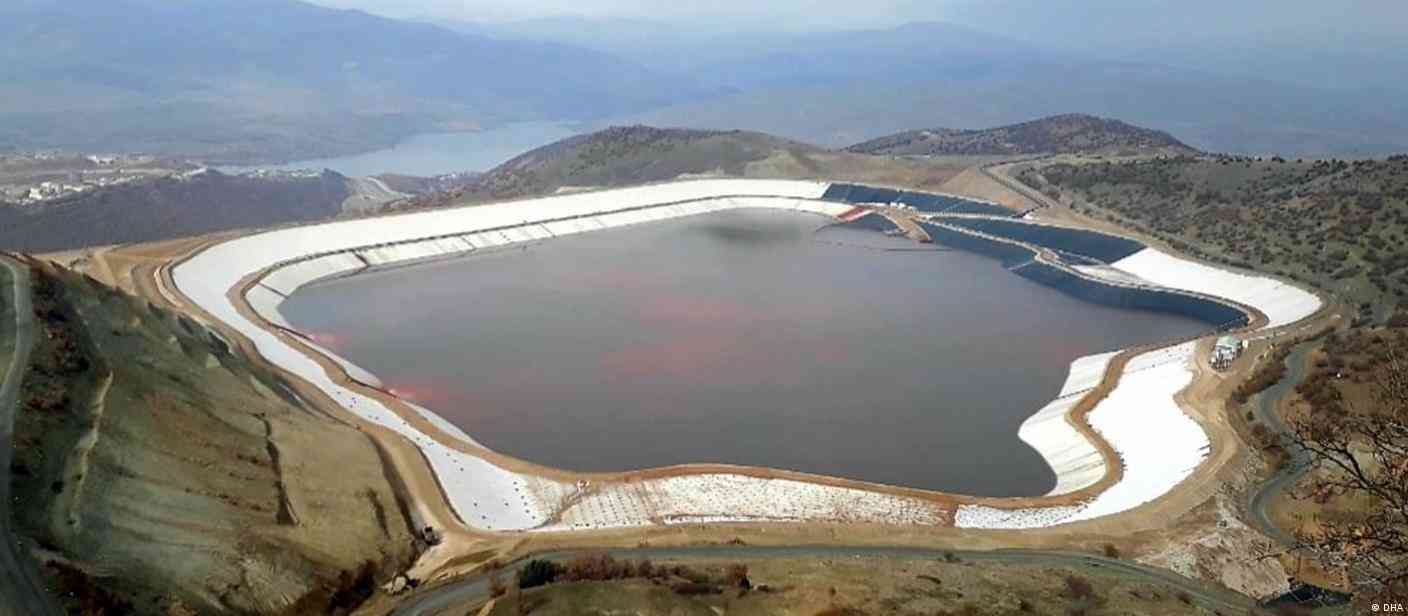
By Kennedy Nyavaya
Seventeen-year-old Regina Maponga* sits on a pile of poles placed next to a haulage truck in which the belongings of scores of families preparing for relocation are being loaded on a Friday morning in Chimanimani.
This is the day she has patiently waited for since her family moved into Aboratum Camp, two-and-half years ago, after losing all they had during Cyclone Idai but the affairs of this day are distant from what she had long imagined.
“I skipped school today so I could help my mother pack our belongings as she moves to our new place,” says Maponga, an ordinary level student, who has to stay behind a little longer to attend her final year classes at a nearby school.
“We lost everything to the cyclone, my mother, sister and myself never managed to retrieve anything. We even lost my 18-month old sibling, who went missing and was never found.”
Since the catastrophic event, victims of Cyclone Idai have stayed in tent shelters dotted across Chimanimani where they have had to endure extreme poverty, countless rainy days, cold nights and lately the immense effects of a raging Covid-19 pandemic.
On the night of March 15, 2019, their lives took an ugly turn as most of the Manicaland province witnessed a Cyclone that left hundreds killed while thousands were injured and traumatised.
Property, homes and income generating projects worth a fortune were lost overnight with vulnerable populations including women and children bearing the worst burdens to date.
- Chamisa under fire over US$120K donation
- Mavhunga puts DeMbare into Chibuku quarterfinals
- Pension funds bet on Cabora Bassa oilfields
- Councils defy govt fire tender directive
Keep Reading
Close to three years later, the government and its donor partners are finally delivering on promises to relocate the various camp occupants to habitable accommodation but it may be a little too late because a lot, some of it irreversible, has happened within these provisional living quarters.
“This life of being crowded in one space is difficult to get used to because the tents are too close to each other, so it is hard to have any privacy or live peacefully,” said Maponga.
According to the teenager, the tiny canvas structures, meant to serve as consolation and a short-term solution to the desperate situation, also turned into a curse for the occupants.
“It is hard to accept up to now because living in tents had turned us into outcasts at school and in the communities,” she said, adding that they ended up “isolating” themselves because of the situation”.
“Our peers viewed us as people of lesser value, which made our lives very difficult.”
Cast into such a reality by unprecedented circumstances, Maponga was desperate to leave this hell on earth, but her options were limited.
Earlier this year she devised a frantic plot to leave the setup through marriage, but all that the futile attempt has produced is an unwanted pregnancy. An addition to her misery.
“My boyfriend and I had agreed that we would get married so I eloped as soon as we figured I was pregnant,” she said.
That was four months ago, but things did not go as planned as the alleged father of the child — two years her senior — from a nearby village is unemployed and still under the care of his parents.
“My in-laws sent me back home so I can finish school first,” said Maponga.
“I made a very bad decision on this one, I really made my mother angry and at school not many view me as a schoolchild anymore because of the pregnancy. Whoever wants to insult or mock me just does so without restraint.”
Her case is not entirely unique in these parts of the country where child marriages are generally high owing to a host of factors among them poverty, religious beliefs and recently the Covid-19 pandemic.
Having encountered the trauma of a high magnitude disaster like Cyclone Idai, communities in the Eastern Highlands were still recovering when the coronavirus outbreak hit.
While the effects of the devastating calamity are still very evident and the people’s shock and fears have been compounded by the emergence of Covid-19.
As a result, trauma and poverty have become twin evils leading to distressing psychosocial effects that have spiked prevalence of risky coping mechanisms including early sex, drug abuse and child marriages.
“Young people in Chimanimani did not have much to do and were left idle following the cyclone destruction trail and school closure (as a result of both Cyclone Idai and Covid-19)so they ended up engaging in uncouth ways,” a National Aids Council (NAC) official told journalists during a tour in December last year.
“Children as young as 12 years old witnessed a lot of death for the first time, this is traumatic even for the elderly who lost their properties and now stay in the tents so after such many usually de-stress by having lots of sex,” said the official.
As a result, there has been a rise in child marriages, unwanted pregnancies, abortions and sexually transmitted diseases.
Nationally, cases of child marriages and teen pregnancy have also been rising at an alarming rate with government statistics pointing at 4959 teenagers falling pregnant while 1774 child marriages were recorded between January and February this year alone.
In a 2020 report, the Research and Advocacy Unit suggested that 31 percent of girls in the country are married before the age of 18 with four percent married before their 15th birthday, this is despite the fact that Zimbabwe is making efforts to criminalize marriages below 18years through the new Marriages Bill”.
Organisations dealing with issues of sexual reproductive health (SRH) and child marriages should engage communities and find out the causes of the menace and explore multi-pronged solutions says Kuda Ndima, a local parent whose under aged daughter was impregnated and subsequently married last year.
“We need that interaction between communities, local leaders and SRH driven organisations. The so-called rights given to our children are leading them astray as they exercise them irresponsibly,” said Ndima.
Her first-born daughter (16) fell pregnant to another teen within Aboratum Camp and she believes that in a different environment this would not have happened.
“Some of these organisations that purport to stand for the rights of children are actually abusing the rights of the parent at some point because it does not make sense to tell a parent not to discipline their child when they see them misbehaving because of rights,” says Ndima.
According to her, there is need for harmony between children’s rights and a parent’s prerogative to discipline a wayward minor under their care, if the country is to put a lid on errant cases of early sex and child marriages.
Meanwhile, at Nhedziwa, 40km from Ngangu (where Aboratum is located), Patience Magombeyi is part of a programme using recreational activities like girls soccer to shield the girls from the idea of pregnancy and premature marriage.
“We use sport to lure them to our SRH education session.
“Our wish is that girls attain education first and get married when they are academically equipped because that will help them live better lives and have healthier marriages,” said the 57-year-old.
Magombeyi, who herself was married at 16, is happy to be a gateway towards a future with less single mothers and marriages of convenience.
“I am helping them endure what I failed when I was their age because there were no people helping us.
“The programmes that we are doing are important because girls can now understand that they need to go to school and attain some form of qualification before they get married,” she said.
If Maponga could get a chance to reverse time she would not hesitate but the deed has been done and all she can do now is focus on creating a better future for herself and the expected baby.
“I am now even more determined to pass than I was before. I want to go to advanced level and university. I want to attain professional qualifications,” she said.
Luckily for her, Zimbabwe amended the country’s Education Act last year, making it illegal to expel pregnant girls from school.
“I know I will pass, my future depends on it so I cannot fail,” said Maponga who, judging from her protruding belly, will be heavily pregnant in December when she sits for the national examinations.
*Name has been changed to protect the identity of the minor.
- This story was made possible through support and funding from Women’s Action Group.










